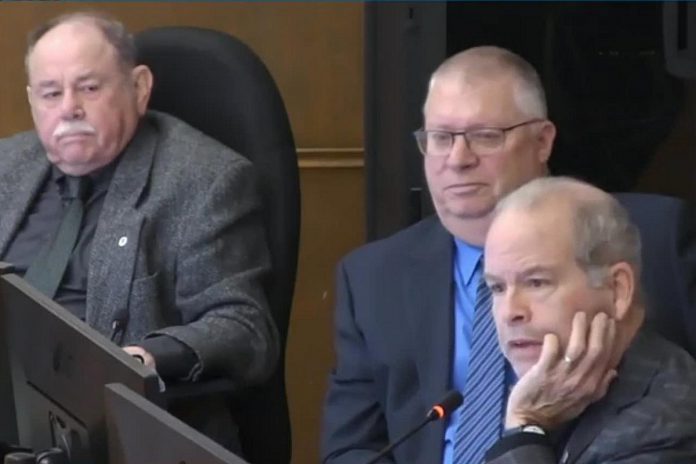
Peterborough city council has approved the expansion of the modular bridge housing community at Wolfe Street, contingent on the city receiving $1.3 million in funding from two newly announced provincial programs intended to address homelessness and expand housing capacity.
Meeting as general committee on Monday night (January 6), council considered a staff report from community services commissioner Sheldon Laidman recommending that the city apply for funding under the Encampment Response Initiative and the Last Mile Funding Program and use this funding to expand the Wolfe Street site by up to 16 more cabins.
City staff had received information about the two new programs from the Ontario Ministry of Municipal Affairs and Housing on December 13, the day following Premier Doug Ford’s announcement that the province would be investing $75.5 million to further support homelessness prevention and provide people living in encampments with access to reasonable alternative accommodation.
According to the staff report, the Encampment Response Initiative will provide municipalities with funding to expand shelter capacity and develop temporary accommodations for people living in encampments. Eligible uses of the funding include constructing temporary structures such as tiny cabins, covering operational costs for shelters, and remediating encampment sites.
The Last Mile Funding Program will accelerate the completion of near-ready affordable housing projects, with a priority on projects that demonstrate value for money and align with the Canada-Ontario Community Housing Initiative (COCHI) guidelines. To qualify, projects must be shovel-ready with construction to begin within 120 days of the signing of the agreement.
Given the potential of funding under the two new provincial programs, the staff report asked council to reconsider its earlier decision of September 16 to defer expanding the modular bridge housing community which, at that time, would have required the city to draw up to $1.12 million from its social services reserve.
As the Encampment Response Initiative had a deadline of January 3 for the city to submit a business case for funding, staff submitted an application to the province prior to Monday’s council meeting, indicating they would withdraw the application should council not approve the staff report.
As the application deadline for the Last Mile Funding Program is Friday (January 10), three days before the next council meeting when general committee decisions would be normally be considered, a special council meeting was scheduled immediately after the general committee meeting so that council could endorse general committee’s decision which, if in favour of the staff report, would allow staff to proceed with that application.
During discussion of the staff report, councillor Joy Lachica asked Laidman whether the city’s application for funding under either program was tied to the current location of the modular bridge housing community at Wolfe Street, or could be used to expand the program at alternate satellite locations.
“I think it would be realistically impossible at this point,” Laidman said, noting that the capital funding must be expended by the end of March. “To be able to do it within the March 31st deadline — to identify a site, bring that to council for approval, then make all changes to the site that would be necessary to allow it to operate to meet that standard — I don’t believe staff could say that would be possible.”
He also pointed out that, since neither program provides operating funding, the capital funding must be used at the current Wolfe Street location as it is already supported by operating funding.
Lachica expressed her concern about the lack of supportive housing for people who are already in the 50 units at the Wolfe Street modular bridge housing community.
“I’m very concerned that we’re not addressing the strategy for Housing First, and that we need to be scaffolding our approach and be providing that next level of supportive housing to those who are ready for it,” she said.
Lachica also expressed her concern about the impact on local businesses and the neighbourhood of expanding the Wolfe Street location with another 16 cabins.
“We’re pleased that it’s been successful, but certainly another 16 units would be impactful if it were to be added on and intensifying that area,” she said. “I’m concerned because (of) our downtown, and as a Ward 3 councillor. We are holding Trinity (Centre), we’re holding Wolfe Street, and we’re holding the current volume of unhoused people living in tents right now.”
“We need to think about it being a whole city endeavour and about satellite locations so that no one area is holding and struggling through some of the issues that arise. I have some difficulty in representing my community members and the businesses that I’m in regular communication with, the concerns that exist, for intensifying in the downtown area something that could be dispersed more widely to other parts of our core city.”
Councillor Alex Bierk said that “the intensity of homelessness downtown is already happening.”
“It does not go away if we do not do this,” he added. “It leaves us to try to deal with the problem without a plan.”
Bierk noted that expanding the Wolfe Street modular bridge housing community “aligns perfectly” with what the provincial government is asking municipalities to do to address encampments.
“We have a proven formula that has worked to stabilize not only the neighbourhood, but individuals experiencing homelessness,” he said. “I don’t really feel like it’s my place to speak to some of those stories publicly, because they’re not my stories, but stories that I’ve heard are heart-wrenching. I’ve heard from mothers who have reconnected with family members. What we’ve been able to do there in a short amount of time on a limited budget has been the best we can do.”
Bierk said there are currently 357 people unhoused in the city and only 127 shelter beds available. He said the Wolfe Street location has the required support services and the space available to expand, and that the Elizabeth Fry Society can manage to support another 16 people within the current operating budget.
Councillor Dave Haacke asked Laidman about the amount of funding available to municipalities under the two new programs and the city’s chances for success in applying for the funding.
Laidman said there is $20 million available under the Encampment Response Initiative and $50 million available for the Last Mile Funding Program and the city is applying for both programs. Although there are 444 municipalities in Ontario, the funding is only available to the 47 housing service managers in the province.
Laidman also noted that, given the tight application deadline for both programs over the holidays, other municipalities might not have had time to submit an application, and that could increase the city’s chance of success.
In response to another question from Haacke, the city’s homelessness programming manager Jocelyn Blazey confirmed the city is applying for $1.3 million under both programs.
In his comments, Mayor Jeff Leal noted the supportive and affordable housing options in the city, specifically Brock Mission’s proposal to build a 50-suite 10-storey building to would help men and women move from homelessness to permanent housing, and the six-storey 53-unit building at 681 Monaghan Road for affordable housing that will be opening soon.
Councillor Kevin Duguay expressed his concern that adding another 16 units to Wolfe Street might obligate the city to provide an additional 16 supportive housing units, and asked Laidman if this would be the case.
“The act of actually adding 16 units to Wolfe Street isn’t compounding that issue, it’s helping the issue of at least allowing 16 additional persons to have housing at all,” Laidman said. “It’s not requiring additional supportive housing on the next level. It’s just meaning that we’re providing greater housing on the initial level. That demand is always going to be there, whether council allows these 16 or not.”
Duguay also expressed a concern there may be operational and capital consequences for the city in the future, both for continuing to support the Wolfe Street project as well as coming up with additional supportive housing.
“It’s something we have to do, but I struggle with the outcomes of the 16 additional units and its financial implications to our community,” he said.
Councillor Keith Riel said the Wolfe Street community is a success and expanding it would provide more people with immediate shelter, while acknowledging the lack of supportive housing.
“People have found jobs. People want to go to treatment. People are getting their lives together. They’re ready to go into their permanent house. It’s not available because … we don’t have a partner with the federal and provincial government to help us build housing we need. But right now tonight, we need to house 16 individuals that are out there in the elements.”
Riel also noted comments he heard during his last meeting with the neighbourhood about the Wolfe Street site.
“‘Keith, we can’t believe how quiet it is. Take the fence down.’ You could’ve knocked me over. I said, ‘We spent $150,000 putting the friggin’ thing up and you want us to take it down?’ ‘We want to integrate with this group, they’re part of our neighbourhood.'”
After councillor Gary Baldwin asked whether there would be additional operational costs to support the 16 additional units, homelessness programming manager Jocelyn Blazey said the Elizabeth Fry Society has confirmed it can accommodate up to 16 additional people within current operational funding.
“Given the track record sometimes of our applications, I’m not that optimistic that we’re going to get any funding — I hope we do, but I’m not convinced we will,” Baldwin said. “I’m trying to measure my heart against my head. Sometimes my head says we shouldn’t approve this, but my heart is saying that we should, so I will support the recommendations.”
In response to a question from councillor Duguay about when provincial funding for the Wolfe Street project will end, Blazey said the allocation is usually on a three-year cycle and ends in March 2026. While the city has historically always received funding for homelessness, and received an increase in the last allocation that supported Wolfe Street, she said it is not yet known how much the city will receive in the next allocation cycle.
After discussion concluded, general committee voted 6-5 to endorse the city staff report, with Mayor Leal and councillors Bierk, Riel, Baldwin, Duguay, and Matt Crowley voting in favour, and councillors Lachica, Haacke, Don Vassiliadis, Andrew Beamer, and Lesley Parnell voting against.
In the special city council meeting that followed general committee, councillor Beamer spoke about his concerns about the cost of homelessness programs, that the city would have to financially support the Wolfe Street program after provincial funding ends, and that there is too much impact on property taxpayers who are themselves struggling with the cost of living.
City council then voted 6-5 in support of general committee’s decision, with the same voting record as general committee.


























